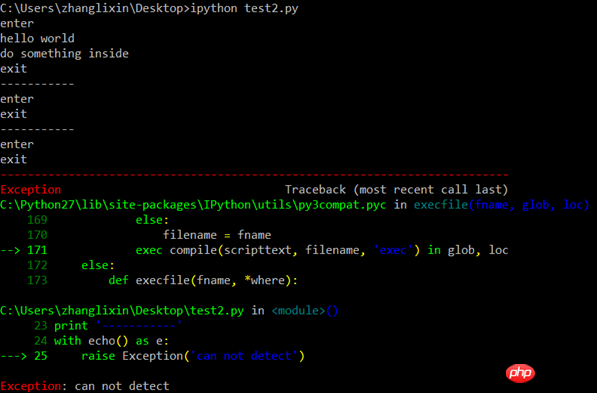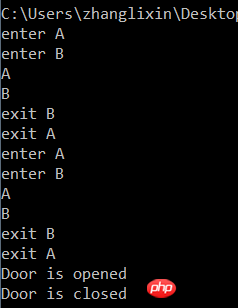 Backend Development
Backend Development
 Python Tutorial
Python Tutorial
 Detailed explanation of the usage examples of with and contextlib in Python basic tutorial
Detailed explanation of the usage examples of with and contextlib in Python basic tutorial
Detailed explanation of the usage examples of with and contextlib in Python basic tutorial
This article mainly introduces the usage of with and contextlib in Python. It analyzes the functions, usage methods and related precautions of with and contextlib in detail in the form of examples. Friends in need can refer to it
The examples in this article describe the usage of with and contextlib in Python. Share it with everyone for your reference, the details are as follows:
In the normal coding process, the with scenario that is often used is (opening a file for file processing, and then implicitly executing the closing of the file handle, which is also suitable for sockets) Classes, these classes provide support for with):
with file('test.py','r') as f : print f.readline()
The role of with is similar to try...finally..., providing a context mechanism, To apply the with statement, the class must provide two built-in functions __enter__ and __exit__. The former is executed before the main code is executed, and the latter is executed after the main code is executed. The variables after as are returned in the __enter__ function. Through the following code snippet and comments, you can clearly understand the usage of __enter__ and __exit__:
##
#!encoding:utf-8
class echo :
def output(self) :
print 'hello world'
def __enter__(self):
print 'enter'
return self #返回自身实例,当然也可以返回任何希望返回的东西
def __exit__(self, exception_type, exception_value, exception_traceback):
#若发生异常,会在这里捕捉到,可以进行异常处理
print 'exit'
#如果改__exit__可以处理改异常则通过返回True告知该异常不必传播,否则返回False
if exception_type == ValueError :
return True
else:
return False
with echo() as e:
e.output()
print 'do something inside'
print '-----------'
with echo() as e:
raise ValueError('value error')
print '-----------'
with echo() as e:
raise Exception('can not detect') 
from contextlib import contextmanager
@contextmanager
def make_context() :
print 'enter'
try :
yield {}
except RuntimeError, err :
print 'error' , err
finally :
print 'exit'
with make_context() as value :
print valuefrom contextlib import contextmanager
from contextlib import nested
from contextlib import closing
@contextmanager
def make_context(name) :
print 'enter', name
yield name
print 'exit', name
with nested(make_context('A'), make_context('B')) as (a, b) :
print a
print b
with make_context('A') as a, make_context('B') as b :
print a
print b
class Door(object) :
def open(self) :
print 'Door is opened'
def close(self) :
print 'Door is closed'
with closing(Door()) as door :
door.open()
Summary: Python has many Powerful features, because we are usually accustomed to some previous programming habits of C++ or Java, we often overlook these good mechanisms. Therefore, we must learn to use these python features to make the python programs we write more like python.
The above is the detailed content of Detailed explanation of the usage examples of with and contextlib in Python basic tutorial. For more information, please follow other related articles on the PHP Chinese website!

Hot AI Tools

Undresser.AI Undress
AI-powered app for creating realistic nude photos

AI Clothes Remover
Online AI tool for removing clothes from photos.

Undress AI Tool
Undress images for free

Clothoff.io
AI clothes remover

AI Hentai Generator
Generate AI Hentai for free.

Hot Article

Hot Tools

Notepad++7.3.1
Easy-to-use and free code editor

SublimeText3 Chinese version
Chinese version, very easy to use

Zend Studio 13.0.1
Powerful PHP integrated development environment

Dreamweaver CS6
Visual web development tools

SublimeText3 Mac version
God-level code editing software (SublimeText3)

Hot Topics
 1377
1377
 52
52
 Do mysql need to pay
Apr 08, 2025 pm 05:36 PM
Do mysql need to pay
Apr 08, 2025 pm 05:36 PM
MySQL has a free community version and a paid enterprise version. The community version can be used and modified for free, but the support is limited and is suitable for applications with low stability requirements and strong technical capabilities. The Enterprise Edition provides comprehensive commercial support for applications that require a stable, reliable, high-performance database and willing to pay for support. Factors considered when choosing a version include application criticality, budgeting, and technical skills. There is no perfect option, only the most suitable option, and you need to choose carefully according to the specific situation.
 HadiDB: A lightweight, horizontally scalable database in Python
Apr 08, 2025 pm 06:12 PM
HadiDB: A lightweight, horizontally scalable database in Python
Apr 08, 2025 pm 06:12 PM
HadiDB: A lightweight, high-level scalable Python database HadiDB (hadidb) is a lightweight database written in Python, with a high level of scalability. Install HadiDB using pip installation: pipinstallhadidb User Management Create user: createuser() method to create a new user. The authentication() method authenticates the user's identity. fromhadidb.operationimportuseruser_obj=user("admin","admin")user_obj.
 Can mysql workbench connect to mariadb
Apr 08, 2025 pm 02:33 PM
Can mysql workbench connect to mariadb
Apr 08, 2025 pm 02:33 PM
MySQL Workbench can connect to MariaDB, provided that the configuration is correct. First select "MariaDB" as the connector type. In the connection configuration, set HOST, PORT, USER, PASSWORD, and DATABASE correctly. When testing the connection, check that the MariaDB service is started, whether the username and password are correct, whether the port number is correct, whether the firewall allows connections, and whether the database exists. In advanced usage, use connection pooling technology to optimize performance. Common errors include insufficient permissions, network connection problems, etc. When debugging errors, carefully analyze error information and use debugging tools. Optimizing network configuration can improve performance
 Navicat's method to view MongoDB database password
Apr 08, 2025 pm 09:39 PM
Navicat's method to view MongoDB database password
Apr 08, 2025 pm 09:39 PM
It is impossible to view MongoDB password directly through Navicat because it is stored as hash values. How to retrieve lost passwords: 1. Reset passwords; 2. Check configuration files (may contain hash values); 3. Check codes (may hardcode passwords).
 How to solve mysql cannot connect to local host
Apr 08, 2025 pm 02:24 PM
How to solve mysql cannot connect to local host
Apr 08, 2025 pm 02:24 PM
The MySQL connection may be due to the following reasons: MySQL service is not started, the firewall intercepts the connection, the port number is incorrect, the user name or password is incorrect, the listening address in my.cnf is improperly configured, etc. The troubleshooting steps include: 1. Check whether the MySQL service is running; 2. Adjust the firewall settings to allow MySQL to listen to port 3306; 3. Confirm that the port number is consistent with the actual port number; 4. Check whether the user name and password are correct; 5. Make sure the bind-address settings in my.cnf are correct.
 Does mysql need the internet
Apr 08, 2025 pm 02:18 PM
Does mysql need the internet
Apr 08, 2025 pm 02:18 PM
MySQL can run without network connections for basic data storage and management. However, network connection is required for interaction with other systems, remote access, or using advanced features such as replication and clustering. Additionally, security measures (such as firewalls), performance optimization (choose the right network connection), and data backup are critical to connecting to the Internet.
 How to optimize MySQL performance for high-load applications?
Apr 08, 2025 pm 06:03 PM
How to optimize MySQL performance for high-load applications?
Apr 08, 2025 pm 06:03 PM
MySQL database performance optimization guide In resource-intensive applications, MySQL database plays a crucial role and is responsible for managing massive transactions. However, as the scale of application expands, database performance bottlenecks often become a constraint. This article will explore a series of effective MySQL performance optimization strategies to ensure that your application remains efficient and responsive under high loads. We will combine actual cases to explain in-depth key technologies such as indexing, query optimization, database design and caching. 1. Database architecture design and optimized database architecture is the cornerstone of MySQL performance optimization. Here are some core principles: Selecting the right data type and selecting the smallest data type that meets the needs can not only save storage space, but also improve data processing speed.
 How to use AWS Glue crawler with Amazon Athena
Apr 09, 2025 pm 03:09 PM
How to use AWS Glue crawler with Amazon Athena
Apr 09, 2025 pm 03:09 PM
As a data professional, you need to process large amounts of data from various sources. This can pose challenges to data management and analysis. Fortunately, two AWS services can help: AWS Glue and Amazon Athena.



